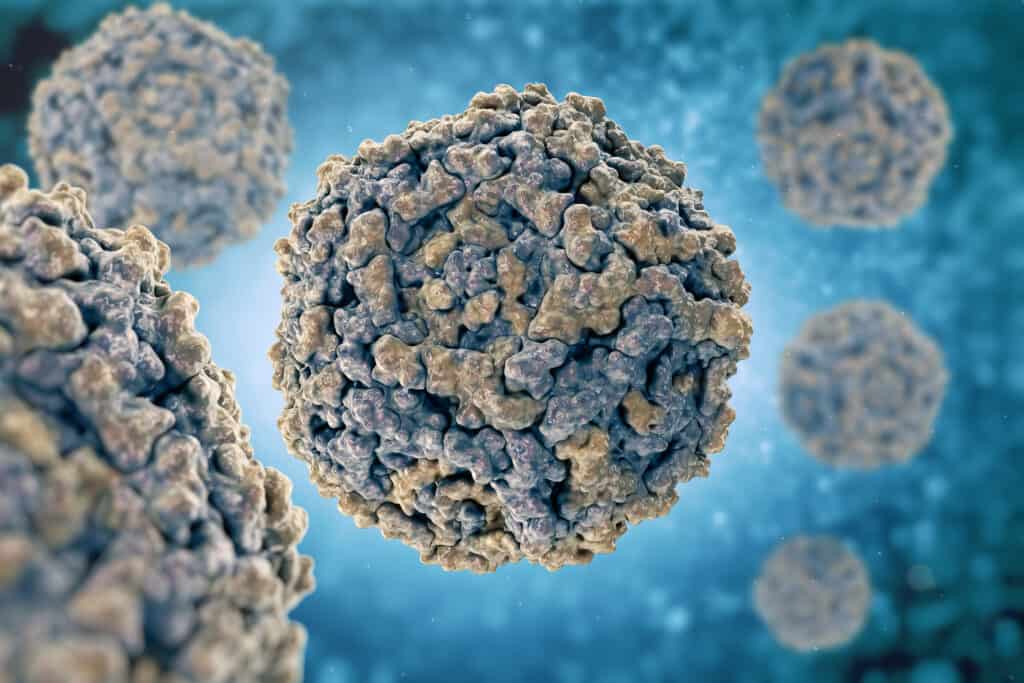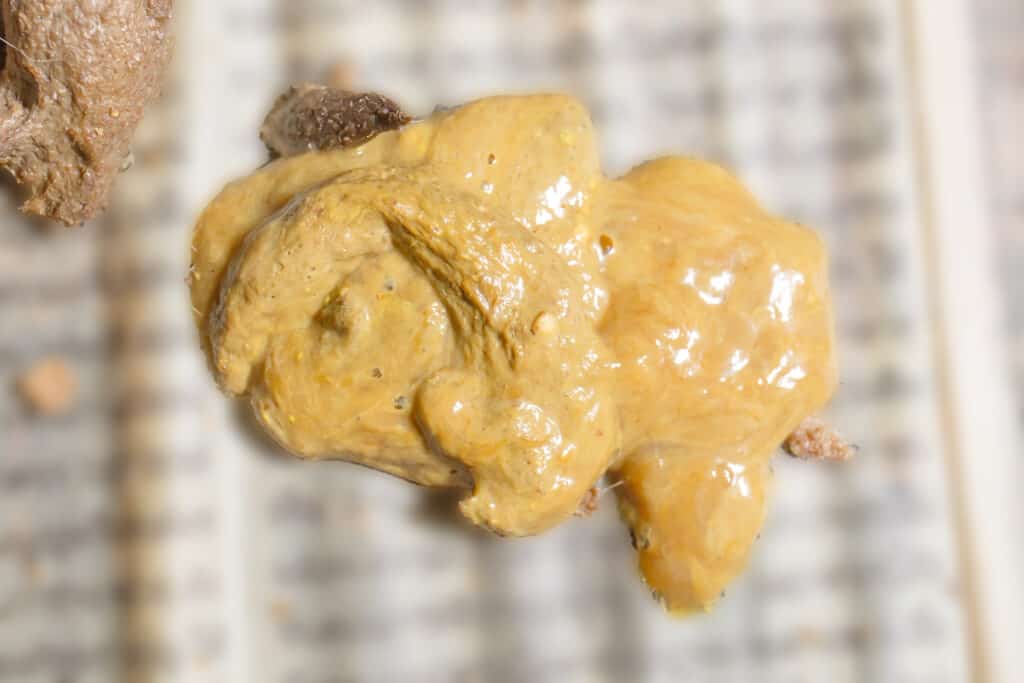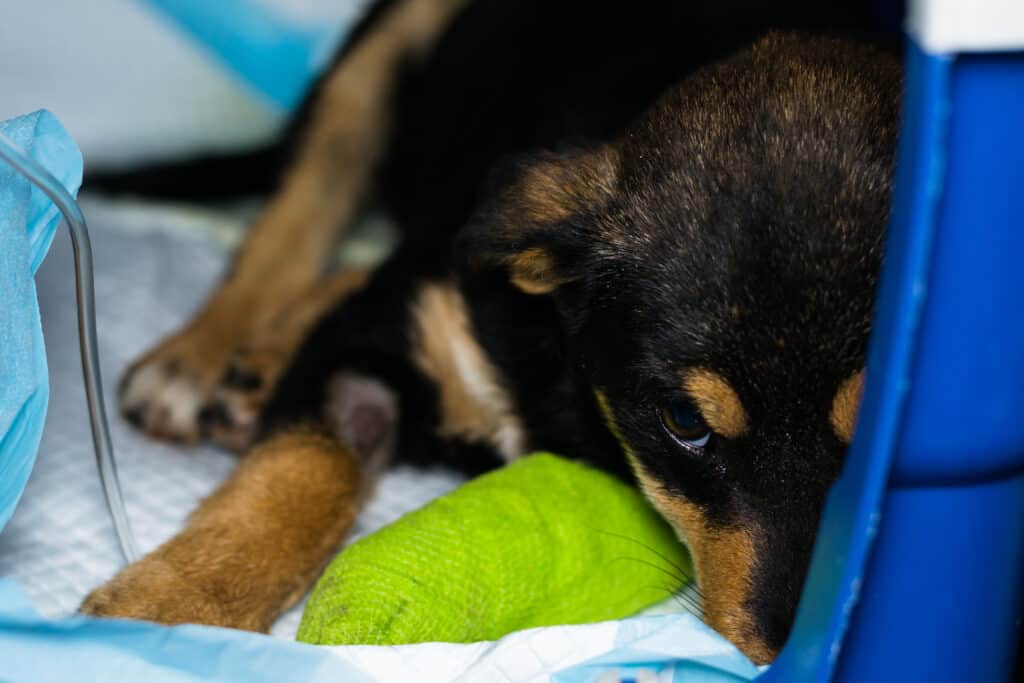If you are the lucky pet parent of a lovable pup, you have likely heard of the deadly disease known as Parvovirus. Parvovirus is known for targeting young dogs and causing severe gastrointestinal symptoms, with some puppies even losing their life. With how serious of a condition it is, many pet parents wonder if they should be worried about catching it as well.
Thankfully, parvo in dogs cannot be passed onto humans, but there are many other important details you should be aware of. We want you to be as informed as possible when it comes to caring for a puppy with parvo, so let’s break down everything you need to know below!
What Is Parvo In Dogs?
Parvo is a deadly virus that causes severe illness in puppies and young dogs under the age of 3. This virus attacks the gastrointestinal system in dogs, and it invades the cells that reside within the stomach and the intestines. Parvo can also invade the bone marrow in many cases, which leads to a fatal combination of both gastrointestinal symptoms and immune suppression.
Once parvo enters the dog’s body, a combination of life-threatening processes will unfold. The virus will destroy the tissues within the intestinal tract, making it impossible to absorb any nutrients through the damaged intestines. As a result, the dog will develop severe diarrhea and vomiting. This not only makes it impossible for the pup affected to keep down any food or liquids, but they will also be dehydrating at a rapid rate due to their symptoms. Many dogs will also develop systemic infections due to their damaged intestinal tissue and their weakened immune system.
Due to the severe complications we listed above, parvo is typically fatal if the puppy does not receive medical care from the moment their symptoms begin. This is why parvo is a pet parent’s worst fear, as there is a significant threat of your pup becoming gravely ill.

Parvovirus can destroy your dog’s intestinal lining, causing diarrhea and vomiting.
©vitstudio/Shutterstock.com
What Are The Symptoms Of Parvo In Dogs?
Parvo mainly impacts the digestive system in our canine friends, so this means you will likely see severe signs of an upset stomach. We want you to be able to spot parvo in your pup from the moment it develops, so let’s list the most common signs to be on the lookout for below.
Symptoms of parvo in dogs include:
- Vomiting, even after just drinking water
- Diarrhea
- Bloody diarrhea
- Foul smelling diarrhea
- Decreased appetite or not eating at all
- Abdominal pain
- Gas
- Lethargy
- Weakness
- Fever
- Appearing disoriented
- Collapsing
- Seizures due to low blood sugar
If you notice any of the above symptoms in your furry friend, we suggest having them seen by your veterinarian as soon as possible. Even if parvo is not the cause of your dog’s upset stomach, these symptoms still require veterinary care.
How Does Parvo Spread From Dog To Dog?
Part of what makes parvo so scary is how easy it is for your puppy to become infected. If your dog is not fully vaccinated against parvovirus, there are a variety of ways that they can pick up the virus. To make sure you know how to avoid this deadly virus, let’s break down the most common ways that dogs spread parvo to other dogs.
The first way that parvo spreads from dog to dog is through direct contact with an infected pup. This means being in close proximity with a sick dog and their bodily secretions, so often through playing and greeting. The next way that puppies catch parvo is by coming in contact with infected stool or vomit. This means that your pup doesn’t have to meet the infected dog themselves, but just stumble upon their infected waste.
And last, your unvaccinated pup can become infected with parvovirus if they come in contact with a surface that has been contaminated with infected stool or vomit. This could mean grass, soil, food or water bowls, dog toys, and anything else a sick dog may have soiled. Parvo can also survive in an environment for up to 3 years if it is not properly disinfected, so you may have no idea that an area is contaminated.
The standard incubation period for parvo in dogs is 5-14 days, and this is the period from when they are infected to when they develop symptoms. If you think your puppy may have come in contact with parvo recently, we suggest keeping a close eye on them for the 2 weeks that follow!

One of the main ways dogs get infected with parvo is through contact with the feces of a dog already infected.
©LittleDogKorat/Shutterstock.com
Can Dogs Spread Parvo To Humans?
Now that you understand what parvovirus is and how it spreads from dog to dog, it’s time to determine whether or not dogs can spread parvo to humans! Thankfully for the pet parents with a parvo positive pup in their home, it is impossible for dogs to spread parvo to humans. The type of parvo that infects dogs is species-specific, so this means the virus can only survive inside the canine body. There is a type of parvo found in humans that we will discuss below, but the type of parvo found in dogs can only infect other dogs.
Can Humans Spread Parvo To Dogs?
While dogs may not be able to spread their parvo to humans, there is a type of parvo that humans can catch from other humans! Parvo B19 is a virus that only impacts people, and it is most commonly seen in children. This type of parvo often causes a skin rash, painful joints, and anemia, so it is very different from the parvo found in dogs. Parvo B19 also spreads most often through infected saliva or mucus, so it is not spread through contact with vomiting and diarrhea as we discussed in canine parvo above.
Just like parvo in dogs, humans cannot spread parvo B19 to dogs. This virus is also species-specific, so it can only be spread from human to human. If you have recently been diagnosed with parvo B19, you do not have to worry about spreading it to your canine companion.
Can You Treat Parvo In Dogs?
Thankfully, parvovirus in dogs can be treated. There is no set treatment plan that each puppy with parvo will receive, but it will always involve restoring hydration and managing their gastrointestinal symptoms. Most dogs will require at least 24 hours in a hospital setting on IV fluids, as well as other injectable meds that control their symptoms and pain. Some pups will recover with aggressive at-home care, but this is typically only an option with cases that are less severe or caught extremely early on.
You and your vet will also have to work to not only keep your pup well hydrated moving forward but to also find a way to restore their appetite and offer them adequate nourishment. Many dogs with parvo will experience significant intestinal irritation as a result of their illness, so it can take time to get them back to where they were before. Most dogs will need a bland diet for at least 2 weeks after their diagnosis, and can then transition back to their standard diet.
The most essential part of treating parvo is by catching it early, so we always suggest seeking veterinary care from the moment your pup develops severe GI upset. The earlier your canine friends get treatment, the better their chance at a full recovery!

Dogs infected with parvos will require at least 24 hours of IV infusions, as well as other injectable meds that control their symptoms and pain.
©Todorean-Gabriel/Shutterstock.com
How Do You Prevent Parvo In Dogs?
Parvo in puppies may sound scary, but there is an effective way to prevent your pup from catching it in the future. Parvo can be prevented with the use of 3 parvovirus vaccinations offered 3-4 weeks part, as well as keeping up with their booster doses each year. As long as you stay up to date with your dog’s vaccines and avoid public settings until they are fully vaccinated, your pup should have a healthy future ahead of them!
Final Thoughts
If you are caring for a sick pup with parvovirus, you do not have to worry about getting sick yourself. Parvo cannot be spread from dog to human, so you can offer them around-the-clock care without worrying!
Up Next:
- If Your Dog Has Parvo, This Is How They Got It and How to Treat It
- Can Adult Dogs Get Parvo? How Can you Tell?
- The Best Sensitive Stomach Dog Food for 2022: Reviewed and Ranked
The photo featured at the top of this post is © Todorean-Gabriel/Shutterstock.com
Ready to discover the top 10 cutest dog breeds in the entire world?
How about the fastest dogs, the largest dogs and those that are -- quite frankly -- just the kindest dogs on the planet? Each day, AZ Animals sends out lists just like this to our thousands of email subscribers. And the best part? It's FREE. Join today by entering your email below.
Sources
- , Available here: https://vcahospitals.com/know-your-pet/parvovirus-in-dogs
- , Available here: https://www.cdc.gov/parvovirusb19/about-parvovirus.html
- (1970)
Thank you for reading! Have some feedback for us? Contact the AZ Animals editorial team.






